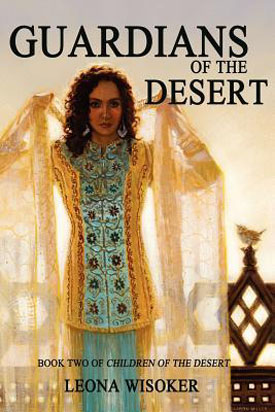 Guardians of the Desert is the second installment in Leona Wisoker’s Children of the Desert. Happily, Wisoker has avoided most of the symptoms of “middle novel syndrome” and provided a story that builds on Secrets of the Sands while introducing enough new information to keep us engaged.
Guardians of the Desert is the second installment in Leona Wisoker’s Children of the Desert. Happily, Wisoker has avoided most of the symptoms of “middle novel syndrome” and provided a story that builds on Secrets of the Sands while introducing enough new information to keep us engaged.
The center of this volume is Lord Alyea Peysimun, sent as King Oruen’s viceroy to the fortress of Scratha while he sent Lord Cafad Scratha, at that point the sole known survivor of his Family and an exile, on a “research” project in the opposite direction. (There was a bit of unpleasantness concerning the daughter of another southern Family.) Needless to say, things didn’t turn out as Oruen had planned: Alyea has become a full desert lord, which is a status that northerners, as we learn, don’t really understand. Deiq, the “merchant” who fell in with the company on their way south, is now Alyea’s mentor as she grows into her new status, which is not only political, but physical, mental and emotional. Meanwhile, the Bright Bay street urchin, Idisio, whom Cafad intended to send north to complete the “research project” and who has a mind of his own, has come south as well.
However, now that Alyea is a full desert lord, and Scratha has not only returned to his ancestral home but been recognized by the resident ha’rethe as the rightful lord, it seems the best course for Alyea is to return to Bright Bay, her own family’s seat, and act as an intermediary between the King and the Families.
One of the key things that Wisoker has managed in this volume is that, although there is a wealth of development of character and milieu, additional histories and insights, new characters and new dimensions on old situations, one never feels as though the story stops — there are enough smaller story lines within the overall story line of Alyea coming into her new status that the momentum never really flags. (Well, there are places where characters are sometimes talking more than they need to, but those are few and minor.)
And there are a number of places where Wisoker has built a fine-drawn tension into the story, and not always in the main action: I, at least, was on pins and needles waiting for a resolution to the kidnapping of Idisio. Alas — I will have to wait for the next volume, but it’s examples like that one that point up Wisoker’s ability to maintain the story’s momentum and keep us on the edges of our seats through events that aren’t even central to the action at hand.
If you, Gentle Reader, think I’ve left out too many things here — what is a ha’rethe, and are Deaq and Idisio fully human, and why is a “desert lord” so special? — well, this universe is too rich and too detailed to pack into a review, and the same goes for the characters and the story. You’ll just have to go back and read The Secrets of the Sands and then catch up with this volume and then go on to Bells of the Kingdom. You won’t regret it.
(Mercury Retrograde Press, 2010)
